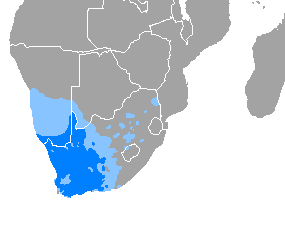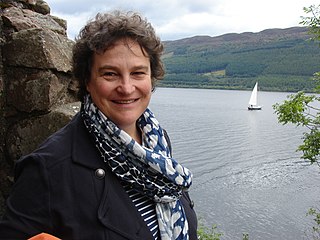
Afrikaans is a West Germanic language that evolved in the Dutch Cape Colony from the Dutch vernacular of Holland proper used by Dutch, French, and German settlers and people enslaved by them. Afrikaans gradually began to develop distinguishing characteristics during the course of the 18th century. Now spoken in South Africa, Namibia and Botswana, Zambia and Zimbabwe, estimates c. 2010 of the total number of Afrikaans speakers range between 15 and 23 million. Most linguists consider Afrikaans to be a partly creole language.

Belgium, officially the Kingdom of Belgium, is a country in Northwestern Europe. The country is bordered by the Netherlands to the north, Germany to the east, Luxembourg to the southeast, France to the southwest, and the North Sea to the northwest. It covers an area of 30,689 km2 (11,849 sq mi) and has a population of more than 11.5 million, making it the 22nd most densely populated country in the world and the 6th most densely populated country in Europe, with a density of 376/km2 (970/sq mi). Belgium is part of an area known as the Low Countries, historically a somewhat larger region than the Benelux group of states, as it also included parts of northern France. The capital and largest metropolitan region is Brussels; other major cities are Antwerp, Ghent, Charleroi, Liège, Bruges, Namur, and Leuven.

Stephanus Johannes Paulus Kruger was a South African politician. He was one of the dominant political and military figures in 19th-century South Africa, and State President of the South African Republic from 1883 to 1900. Nicknamed Oom Paul, he came to international prominence as the face of the Boer cause—that of the Transvaal and its neighbour the Orange Free State—against Britain during the Second Boer War of 1899–1902. He has been called a personification of Afrikanerdom, and remains a controversial figure; admirers venerate him as a tragic folk hero.

General anaesthesia (UK) or general anesthesia (US) is a method of medically inducing loss of consciousness that renders a patient unarousable even with painful stimuli. This effect is achieved by administering either intravenous or inhalational general anaesthetic medications, which often act in combination with an analgesic and neuromuscular blocking agent. Spontaneous ventilation is often inadequate during the procedure and intervention is often necessary to protect the airway. General anaesthesia is generally performed in an operating theater to allow surgical procedures that would otherwise be intolerably painful for a patient, or in an intensive care unit or emergency department to facilitate endotracheal intubation and mechanical ventilation in critically ill patients.

Climate change mitigation is action to limit climate change. This action either reduces emissions of greenhouse gases or removes those gases from the atmosphere. The recent rise in global temperature is mostly due to emissions from burning fossil fuels such as coal, oil, and natural gas. There are various ways that mitigation can reduce emissions. These are transitioning to sustainable energy sources, conserving energy, and increasing efficiency. It is possible to remove carbon dioxide from the atmosphere. This can be done by enlarging forests, restoring wetlands and using other natural and technical processes. The name for these processes is carbon sequestration. Governments and companies have pledged to reduce emissions to prevent dangerous climate change. These pledges are in line with international negotiations to limit warming.

Marlene van Niekerk is a South African poet, writer, and academic. She is best known for her novels, the satirical tragicomedy Triomf (1994) and the Hertzog-winning Agaat (2004), which explore themes including the family, the change in power dynamics occasioned by the end of Apartheid, and inequalities of race, gender, and class. Van Niekerk is also an award-winning poet. She writes in her native tongue, Afrikaans, and teaches at Stellenbosch University.
Paul Roos Gymnasium is a public, dual medium high school for boys in the town of Stellenbosch in the Western Cape province of South Africa, which opened on 1 March 1866 as Stellenbosch Gymnasium. It is the 12th oldest school in the country.
The Hertzog Prize is an annual award given to Afrikaans writers by the Suid-Afrikaanse Akademie vir Wetenskap en Kuns, formerly the South African Academy for Language, Literature and Arts. It is the most prestigious prize in Afrikaans literature.

South Africa, officially the Republic of South Africa, is the southernmost country in Africa. It is bounded to the south by 2,798 kilometres (1,739 mi) of coastline that stretches along the South Atlantic and Indian Oceans; to the north by the neighbouring countries of Namibia, Botswana, and Zimbabwe; and to the east and northeast by Mozambique and Eswatini. It also completely enclaves the country Lesotho. It is the southernmost country on the mainland of the Old World, and the second-most populous country located entirely south of the equator, after Tanzania. South Africa is a biodiversity hotspot, with unique biomes, plant and animal life. With over 62 million people, the country is the world's 23rd-most populous nation and covers an area of 1,221,037 square kilometres. Pretoria is the administrative capital, while Cape Town, as the seat of Parliament, is the legislative capital. Bloemfontein has traditionally been regarded as the judicial capital. The largest city, and site of highest court is Johannesburg.

Afrikaners are a Southern African ethnic group descended from predominantly Dutch settlers first arriving at the Cape of Good Hope in 1652. Until 1994, they dominated South Africa's politics as well as the country's commercial agricultural sector.

Pandeism is a theological doctrine that combines aspects of pantheism with aspects of deism. Unlike classical deism, which holds that the creator deity does not interfere with the universe after its creation, pandeism holds that such an entity became the universe and ceased to exist as a separate entity. Pandeism purports to explain why God would create a universe and then appear to abandon it, and pandeism seeks to explain the origin and purpose of the universe.
The 2015 SARU Community Cup will be the third season of the SARU Community Cup competition. The qualification to the tournament will take place in 2014, while the competition proper will be contested in 2015. The tournament is the top competition for non-university rugby union clubs in South Africa.

Anton Carlisle Hartman (1918–1982) was a South African conductor. He was head of music and principal conductor at the South African Broadcasting Corporation (SABC) and head of music at the University of the Witwatersrand. He became a central figure in art music in South Africa during the mid 20th century.
The Eugène Marais Prize is a South African literary prize awarded by the Suid-Afrikaanse Akademie vir Wetenskap en Kuns for a first or early publication in Afrikaans. In 1971 it was renamed after the Afrikaans poet and researcher Eugène Marais. The prize has no genre limitation, but only works that have appeared in the previous calendar year are eligible. Further, an author can only win the award once. The prize money was R22 000 and was sponsored by ABSA and Rapport.

The African humid period is a climate period in Africa during the late Pleistocene and Holocene geologic epochs, when northern Africa was wetter than today. The covering of much of the Sahara desert by grasses, trees and lakes was caused by changes in the Earth's axial tilt; changes in vegetation and dust in the Sahara which strengthened the African monsoon; and increased greenhouse gases. During the preceding Last Glacial Maximum, the Sahara contained extensive dune fields and was mostly uninhabited. It was much larger than today, and its lakes and rivers such as Lake Victoria and the White Nile were either dry or at low levels. The humid period began about 14,600–14,500 years ago at the end of Heinrich event 1, simultaneously to the Bølling–Allerød warming. Rivers and lakes such as Lake Chad formed or expanded, glaciers grew on Mount Kilimanjaro and the Sahara retreated. Two major dry fluctuations occurred; during the Younger Dryas and the short 8.2 kiloyear event. The African humid period ended 6,000–5,000 years ago during the Piora Oscillation cold period. While some evidence points to an end 5,500 years ago, in the Sahel, Arabia and East Africa, the end of the period appears to have taken place in several steps, such as the 4.2-kiloyear event.

The Havenga Prize is a prize awarded annually by the Suid-Afrikaanse Akademie vir Wetenskap en Kuns to a candidate for original research in the Sciences since 1945. Candidates are judged on the quality of research publications and evidence of the promotion of Afrikaans. The Havenga prize can only be awarded to a person once, but can be awarded posthumously.
The Rev. Pieter Daniel Rossouw was a pastor of the Dutch Reformed Church in South Africa (NGK) and an early writer in the Afrikaans language.
The following scientific events occurred in 2022.